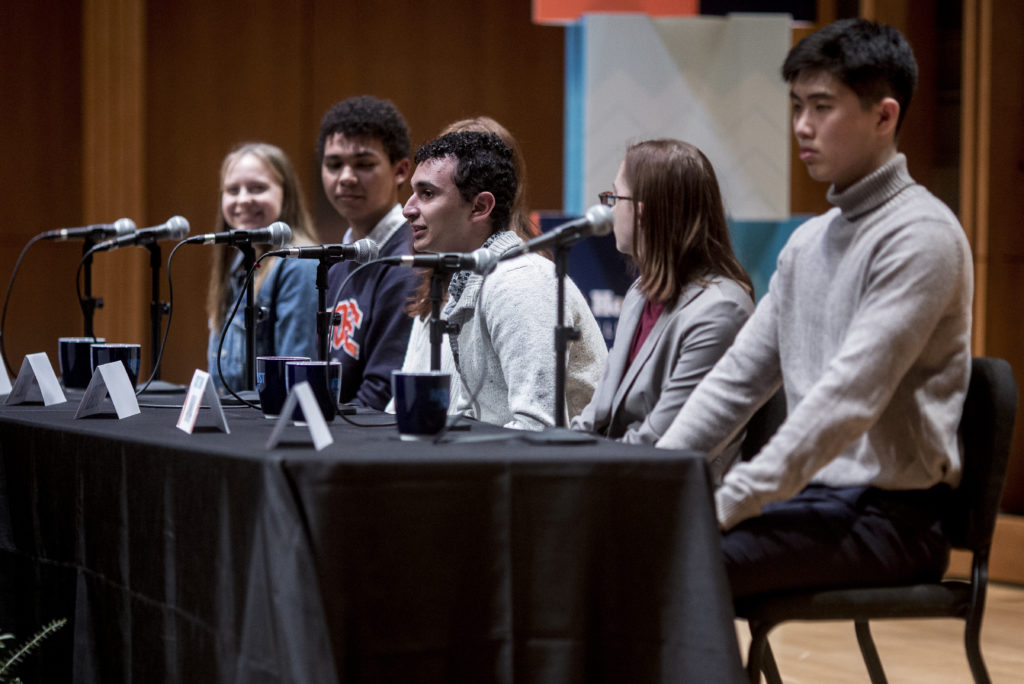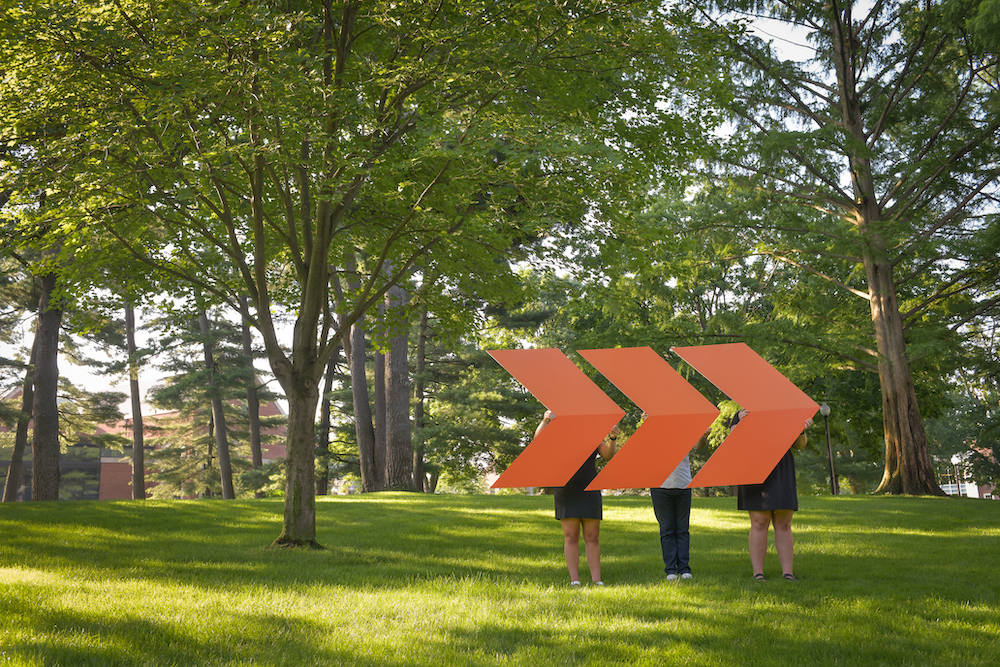This blog post is part of a series. Read the introduction and Meet Some of Our Hope Forward Students.

Jim: I think [people] might be interested to know how you each heard of Hope Forward and what motivated you to apply for this program. YJ, you start.
YJ: Oh man. I’m gonna be dead honest. I just needed the scholarship.
I was looking for colleges. I was thinking I should go to Korea, and America was still a possibility, but it’s just too much money. …I was just praying that God will hopefully find the way. And I got an email from Mr. Crowley saying, ‘There’s a Hope Forward scholarship that’s brand new.’ And I was like, might as well apply, right? Might as well shoot my shot.
Anna: Yes, like Jim said earlier, my grandpa taught here in the ’60s and ’70s. So I’ve heard of Holland but I’d already applied to Hope, been accepted to Hope, and it was on my list of colleges to be considered.
But I received a postcard in the mail in January of my senior year inviting me to apply to this new program that I hadn’t known existed or it hadn’t existed. And then during COVID, we interviewed on Zoom; we wrote our essays; and here we are.
Steven: I think an admissions rep. came all the way to Maryland to a graduating class of 17 students to talk about Hope. And she was so good at her job. She was great. And I wanted to come to Hope before even … receiving anything or knowing what Hope Forward was because Hope was just very academically strong.
And just as someone that’s going into medicine and someone that wants to be involved in research and given opportunity, I wanted to come to Hope. My admissions rep. was like, ‘You should apply to this scholarship.’ And I was like, sure. …We stepped in knowing a little bit about Hope Forward; but I don’t think we realized that it was more than just a scholarship. … Being in it, you realize it’s like a program and it’s a community. And so that was refreshing even just going to the interviews and hearing what they’re looking for and why you’re there.
Jim: Did that change your opinion at all? Or … did you find yourself saying, ‘What am I getting into? I just want a scholarship, and now I’m doing this big thing?’ Did that change at all?
Steven: Yes, ’cause one of the questions I think that people might be thinking is: Well, if you’re getting tuition free, then do you not care about your education as much or do you not … give as much as you would otherwise? And I think it’s the other way around.
I think when we’re given the opportunity, we know we get as much as we put in. And we realize that it is part of something so much greater.
It’s others-focused, and I think that helps us be others-focused and [think about] how much we want to give. And I think it pushes us to do better in all aspects just because we love the vision and we want to give back.
Jim: Sydney, I want you to answer the question. I also want to ask you about your essay and maybe you could explain to these folks the process involved after you decided you wanted to be part of this. What did you have to do?
Sydney: Sure, yeah. So for me, I applied to like 40 schools. I was that person. I had my list. I applied to Hope, literally, two days before the deadline.
So it was such a God thing for me … finding this place. Nothing just seemed right. And when I came to visit Hope and talked with Nicole and … my admissions counselor who would just send me pictures of the sunset every night, like, it’s just such a beautiful place. How could you just not love cute little Holland? I mean, really.
But once I applied to Hope, my admissions counselor was like, ‘Hope Forward, you’ve got to apply. You’re like a shoe-in.’ I’m like, ‘What? What’s Hope Forward?’ And I … wrote an essay. And the essay for me, it was just about …hope and … what does that mean to you. And I think my essay, and then later my presentation about hope and dark parts, they kind of worked hand in hand. My little sister was born with Down syndrome, so we spent lots of time in the hospitals and NICU [neonatal intensive care unit.] And just going from hospital to hospital, that just changes your view on who she is. And one place, they were so sorry … mourning the loss of what her life could have been. And at another place, it’s a celebration. She’s so beautiful, we love her. I just want to be that hope for families.
When they are mourning the loss of what could have been, I want to show them the other side. Look at this brand-new life that you never would’ve gotten to experience.
Jim: Wow.
Sydney: So that’s what my presentation was about. And, yeah, I think that’s just such a beautiful question for everyone to ponder: How can you bring hope into the darkness of the world?
Jim: Davi, in addition to the essay, there’s also the presentation. Walk us through that along with your answer.
Davi: So for me, there was one week in my school called College Week, and every day there would be a little fair of different universities from … around Thailand or Southeast Asia. But also the U.S. would come and would present about their university. And there was one special lunch that was a pizza lunch, and it was just Hope College.
And that’s how I found out about Hope College. And it was also when I heard about the Hope Forward program. At the time, honestly, I just thought, ‘Oh great, it’s just another essay I have to write now.’ Because every time I would get … an acceptance letter or something, although I would feel happy, it wasn’t anything. It was just a piece of paper because I knew that I couldn’t afford anything else.
So I had to just scavenger hunt through the university website like a madman, looking through all the little fine print just to see if there’s any available scholarships that I can possibly take.
In the presentation aspect of the Hope Forward application, I presented on my parents being missionaries in Thailand. And it was also during the pandemic time, so a lot of things were shut down with my father’s ministry.
Everything was just down, nothing was going. In the area I was staying, there were a lot of people who were facing food insecurity.
I knew that God has a purpose for everyone. And I knew that at that moment — I don’t know how to explain it — but there was something in me that told me that maybe I have to do something in terms of food insecurity in my general area.
So I designed a project where I sponsored five families over a course of three months with food. Not only were these families given hope, they could save money and get another day. But through this program, my father’s ministry was able to reopen because it allowed an opportunity for the church in Thailand to step in once again into the community and help that. So, yeah, that was my presentation.
Cora: I wanted to go to a school that would change my life, and Hope College is on the “Colleges that Change Lives” list, so I was intrigued. And I also applied to probably 25 colleges, and I wrote a lot of essays and had a lot of interviews. But Hope Forward was amazing. The interview process was beautiful because it looked at my heart.
So it didn’t matter my test scores and my GPA, though I’m sure those were factored in. I was really able to be myself. I didn’t have to try to be super academic and make a really long essay. Instead, I got to share what I was passionate about, what I cared about, and to whom I wanted to impart my positivity and happiness …
And for the presentation, for the interview, I wanted to make Holland a blue zone. And a blue zone is a place where the instances of chronic disease are lower from lifestyle changes, such as diet and exercise, and promoting a healthy community.
And when I visited Holland, I was here in the summer and it was beautiful. There’s people walking outside and there’s the farmer’s market. … I wanted to be a part of that community, and I think that’s where I could make an impact.
Jim: You guys are doing great. One thing I was concerned about is your integration into the campus life because — not that you’re necessarily set apart — but you’ve got a mission along with your educational process.
Anna has conquered that in spades. Anna is the president of Green Hope on campus and she’s also the chapter lead of the Student’s Demand Action for Gun Sense organization.
Anna, would you tell us about either or both of those organizations?
Anna: Yeah, definitely.
I came to Hope with a lot of passion and I really wanted to get involved. And it can be overwhelming the first week to go to the club fair and see hundreds of clubs that you want to be a part of. But, I knew my passion for sustainability. I wanted to be a part of Green Hope.
And the leaders were transitioning, so I was offered a position to help lead the club. And … that’s what I did my Hope Forward essay and presentation on. I knew that that was where my heart was and how I wanted to serve the Hope community.
And then we recently got approved for a Student’s Demand Action for Gun Sense chapter. So I really also was passionate about the prevention of gun violence and wanted to be a part of changing the culture around campus of how we talk about these issues and how we can prevent future instances of gun violence.
Jim: Outstanding.


